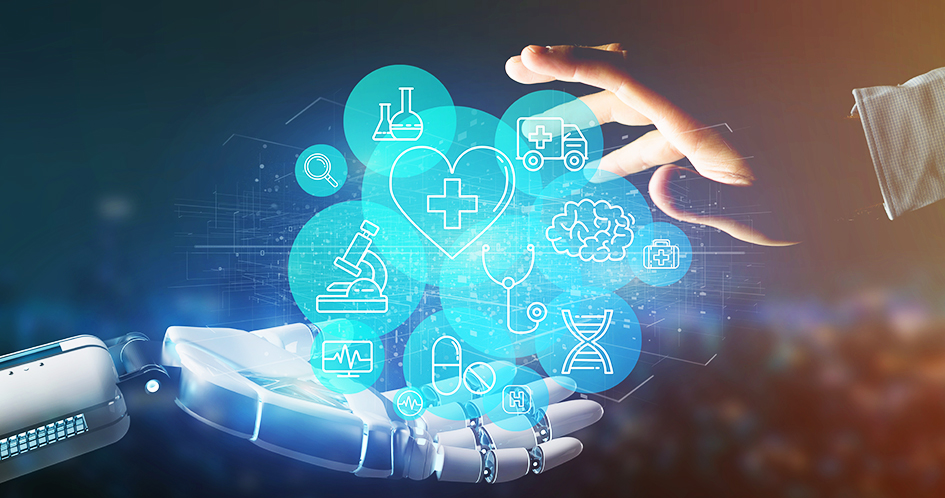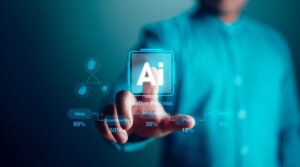Artificial intelligence (AI) is bringing dramatic changes to healthcare, impacting everything from diagnosis to treatment. Adding artificial intelligence technology to healthcare is changing the way healthcare is delivered, making care more accurate, faster, and more tailored to each patient. Artificial intelligence’s ability to process and analyze large amounts of data, learn from patterns and help people make informed healthcare decisions is a key part of this transformation.
1. Artificial Intelligence in Healthcare:
Diagnostics is one of the key areas where artificial intelligence is improving healthcare. Medical images such as X-rays, MRIs and CT scans are increasingly viewed via artificial intelligence systems. These algorithms are designed to identify pattern recognition and abnormalities that could be signs of diseases such as cancer, heart disease and neurological disorders. Artificial intelligence systems can detect these conditions earlier than traditional methods, providing faster help and increasing the likelihood of successful treatment. Artificial intelligence helps reduce human error and provides more accurate medical assessments by improving diagnostic accuracy.
2. Handmade Medicine with Artificial Intelligence:
Artificial intelligence is transforming personalized medicine, allowing treatments to be tailored to each patient. Artificial intelligence systems can understand how people respond to different treatments by looking at their genetic information, lifestyle factors and medical background. This personalized approach ensures that treatment is tailor-made for each patient, increasing the chance of success and reducing the chance of side effects. The use of artificial intelligence in personalized medicine represents a shift from a one-size-fits-all model to a more specific approach that can lead to happier and more successful patients.
3. Application of Artificial Intelligence in Drug Discovery:
Artificial intelligence speeds up the process of finding new drugs, which is important when finding potential new drugs. Traditionally, creating a new medicine takes a long time and costs a lot of money. Bringing new drugs to market can take years. Artificial intelligence speeds up this process by looking at large amounts of biomedical data to find good drug options and guess how effective they will be. Artificial intelligence (AI) also improves the efficiency and success rate of clinical trials by selecting the best subjects and guessing what might happen. This new idea could not only reduce costs, but also speed up the production process of new drugs.
4. Virtual Health Companions and Chatbots:
Virtual health assistants and chatbots, powered by artificial intelligence, are changing the way patients talk to each other and providing them with immediate help and information. These resources can answer frequently asked questions, provide tips on how to manage long-term conditions, and help you make appointments. Virtual health assistants increase patient engagement and ensure everyone has access to their health information 24 hours a day, 7 days a week. This continued support makes it easier for people to take care of their health and for health workers to do their work.
5. Application of Artificial Intelligence in the Office:
Artificial intelligence is not only used in clinical environments, but also simplifies administrative matters in medical institutions. Artificial intelligence systems can automate routine tasks such as booking appointments, making payments and maintaining patient records. This automation makes it easier for healthcare providers to perform daily tasks, so they can focus more on caring for patients. Artificial intelligence also helps reduce errors and improve the overall efficiency of healthcare operations, making the healthcare delivery system more streamlined and efficient.
6. Artificial Intelligence and Predictive Analytics:
Another area making significant progress is predictive analytics, powered by artificial intelligence. To predict future health outcomes and trends, AI systems can look at old data and spot patterns. This skill is useful in preventive care management, such as detecting disease outbreaks, guessing what patients need, and tailoring preventive care plans for each patient. Healthcare professionals can use predictive analytics to make informed choices and take preventative measures that benefit the health of everyone.
7. Questions to Think About and Ethical Issues:
There are many benefits to using artificial intelligence in healthcare, but there are also ethical issues to think about. Concerns about data privacy, security, and the potential for bias in algorithms are important. To maintain trust and effectiveness in healthcare applications, it is important to ensure that AI systems are clear, fair, and follow the rules. To address these issues, we must continue research, take strong measures to protect data, and commit to using only ethical methods when creating and using artificial intelligence.
Conclusion:
There is no doubt that artificial intelligence is dramatically transforming the healthcare industry, making diagnosis better, treatment more personalized, drug discovery faster, and office work more efficient. While there are some issues that need to be resolved, AI technology is constantly improving, which means it will continue to transform healthcare by providing new solutions and improving care overall. As artificial intelligence continues to develop, it could have a dramatic impact on healthcare, leading to dramatic changes in both the clinical and administrative parts of the field.
FAQs:
1. In what ways does AI make medical diagnoses more accurate?
Medical images and other diagnostic data can be analyzed very accurately via artificial intelligence, making the diagnosis more accurate. A computer program called artificial intelligence can spot trends and quirks that people might overlook. For example, AI can use X-rays and MRIs to detect early signs of diseases such as cancer or heart disease. This allows doctors to act faster and make more accurate predictions.
2. What does personalized care mean?
Personalized medicine ensures that every patient receives the best care by taking into account factors such as the patient’s genetics, lifestyle and medical background. Artificial intelligence helps personalize medicine by looking at large amounts of data and guessing how different people will respond to different treatments. This helps doctors create a personalized treatment plan that is more effective and reduces the risk of side effects.
3. How does artificial intelligence accelerate the development of new medicines?
Artificial intelligence speeds up the process of finding new drugs by looking at large data sets to find potential drug candidates and guess their efficacy. Creating new medicines often takes a long time and costs a lot of money. But artificial intelligence can speed up the process by quickly looking at biological data, improving clinical trial design and guessing how drugs interact. It takes less time and costs to bring new medicines to the market.
4. What role do chatbots and virtual health assistants play in healthcare?
Virtual health assistants and chatbots, powered by artificial intelligence, can provide patients with knowledge and support to help them immediately. They can answer medical questions, provide advice on how to manage long-term conditions, and help you make appointments. These tools help patients 24 hours a day, 7 days a week, increasing their engagement and making life easier for human caregivers.
5. How is artificial intelligence used to handle administrative matters in healthcare?
Artificial intelligence is used to automate routine office tasks such as booking appointments, processing invoices and maintaining patient records. This automation makes it easier for caregivers to perform daily tasks, so they can spend more time caring for patients. Artificial intelligence helps healthcare organizations improve overall efficiency by streamlining workflows, reducing errors and speeding up processes.



